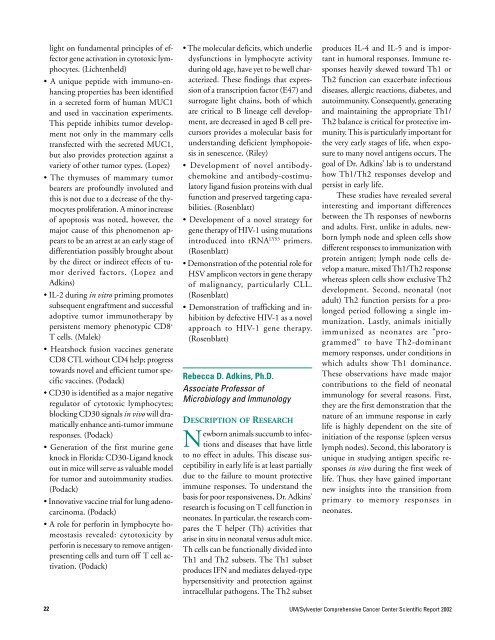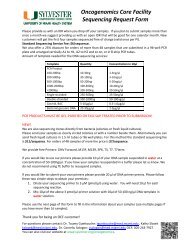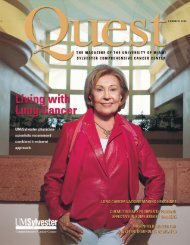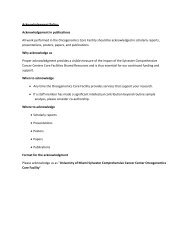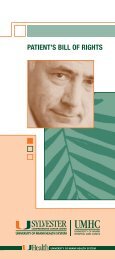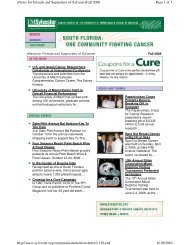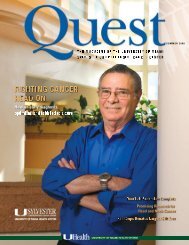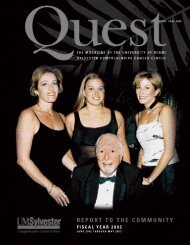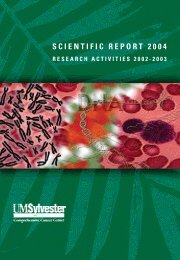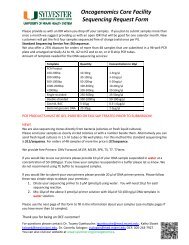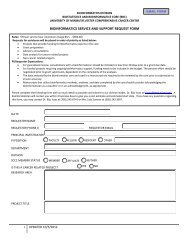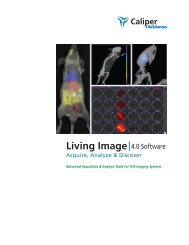tumor cell biology program - Sylvester Comprehensive Cancer Center
tumor cell biology program - Sylvester Comprehensive Cancer Center
tumor cell biology program - Sylvester Comprehensive Cancer Center
You also want an ePaper? Increase the reach of your titles
YUMPU automatically turns print PDFs into web optimized ePapers that Google loves.
light on fundamental principles of effector<br />
gene activation in cytotoxic lymphocytes.<br />
(Lichtenheld)<br />
• A unique peptide with immuno-enhancing<br />
properties has been identified<br />
in a secreted form of human MUC1<br />
and used in vaccination experiments.<br />
This peptide inhibits <strong>tumor</strong> development<br />
not only in the mammary <strong>cell</strong>s<br />
transfected with the secreted MUC1,<br />
but also provides protection against a<br />
variety of other <strong>tumor</strong> types. (Lopez)<br />
• The thymuses of mammary <strong>tumor</strong><br />
bearers are profoundly involuted and<br />
this is not due to a decrease of the thymocytes<br />
proliferation. A minor increase<br />
of apoptosis was noted, however, the<br />
major cause of this phenomenon appears<br />
to be an arrest at an early stage of<br />
differentiation possibly brought about<br />
by the direct or indirect effects of <strong>tumor</strong><br />
derived factors. (Lopez and<br />
Adkins)<br />
• IL-2 during in vitro priming promotes<br />
subsequent engraftment and successful<br />
adoptive <strong>tumor</strong> immunotherapy by<br />
persistent memory phenotypic CD8 +<br />
T <strong>cell</strong>s. (Malek)<br />
• Heatshock fusion vaccines generate<br />
CD8 CTL without CD4 help; progress<br />
towards novel and efficient <strong>tumor</strong> specific<br />
vaccines. (Podack)<br />
• CD30 is identified as a major negative<br />
regulator of cytotoxic lymphocytes;<br />
blocking CD30 signals in vivo will dramatically<br />
enhance anti-<strong>tumor</strong> immune<br />
responses. (Podack)<br />
• Generation of the first murine gene<br />
knock in Florida: CD30-Ligand knock<br />
out in mice will serve as valuable model<br />
for <strong>tumor</strong> and autoimmunity studies.<br />
(Podack)<br />
• Innovative vaccine trial for lung adenocarcinoma.<br />
(Podack)<br />
• A role for perforin in lymphocyte homeostasis<br />
revealed: cytotoxicity by<br />
perforin is necessary to remove antigenpresenting<br />
<strong>cell</strong>s and turn off T <strong>cell</strong> activation.<br />
(Podack)<br />
• The molecular deficits, which underlie<br />
dysfunctions in lymphocyte activity<br />
during old age, have yet to be well characterized.<br />
These findings that expression<br />
of a transcription factor (E47) and<br />
surrogate light chains, both of which<br />
are critical to B lineage <strong>cell</strong> development,<br />
are decreased in aged B <strong>cell</strong> precursors<br />
provides a molecular basis for<br />
understanding deficient lymphopoiesis<br />
in senescence. (Riley)<br />
• Development of novel antibodychemokine<br />
and antibody-costimulatory<br />
ligand fusion proteins with dual<br />
function and preserved targeting capabilities.<br />
(Rosenblatt)<br />
• Development of a novel strategy for<br />
gene therapy of HIV-1 using mutations<br />
introduced into tRNA LYS3 primers.<br />
(Rosenblatt)<br />
• Demonstration of the potential role for<br />
HSV amplicon vectors in gene therapy<br />
of malignancy, particularly CLL.<br />
(Rosenblatt)<br />
• Demonstration of trafficking and inhibition<br />
by defective HIV-1 as a novel<br />
approach to HIV-1 gene therapy.<br />
(Rosenblatt)<br />
Rebecca D. Adkins, Ph.D.<br />
Associate Professor of<br />
Micro<strong>biology</strong> and Immunology<br />
DESCRIPTION OF RESEARCH<br />
Newborn animals succumb to infections<br />
and diseases that have little<br />
to no effect in adults. This disease susceptibility<br />
in early life is at least partially<br />
due to the failure to mount protective<br />
immune responses. To understand the<br />
basis for poor responsiveness, Dr. Adkins’<br />
research is focusing on T <strong>cell</strong> function in<br />
neonates. In particular, the research compares<br />
the T helper (Th) activities that<br />
arise in situ in neonatal versus adult mice.<br />
Th <strong>cell</strong>s can be functionally divided into<br />
Th1 and Th2 subsets. The Th1 subset<br />
produces IFN and mediates delayed-type<br />
hypersensitivity and protection against<br />
intra<strong>cell</strong>ular pathogens. The Th2 subset<br />
produces IL-4 and IL-5 and is important<br />
in humoral responses. Immune responses<br />
heavily skewed toward Th1 or<br />
Th2 function can exacerbate infectious<br />
diseases, allergic reactions, diabetes, and<br />
autoimmunity. Consequently, generating<br />
and maintaining the appropriate Th1/<br />
Th2 balance is critical for protective immunity.<br />
This is particularly important for<br />
the very early stages of life, when exposure<br />
to many novel antigens occurs. The<br />
goal of Dr. Adkins’ lab is to understand<br />
how Th1/Th2 responses develop and<br />
persist in early life.<br />
These studies have revealed several<br />
interesting and important differences<br />
between the Th responses of newborns<br />
and adults. First, unlike in adults, newborn<br />
lymph node and spleen <strong>cell</strong>s show<br />
different responses to immunization with<br />
protein antigen; lymph node <strong>cell</strong>s develop<br />
a mature, mixed Th1/Th2 response<br />
whereas spleen <strong>cell</strong>s show exclusive Th2<br />
development. Second, neonatal (not<br />
adult) Th2 function persists for a prolonged<br />
period following a single immunization.<br />
Lastly, animals initially<br />
immunized as neonates are “<strong>program</strong>med”<br />
to have Th2-dominant<br />
memory responses, under conditions in<br />
which adults show Th1 dominance.<br />
These observations have made major<br />
contributions to the field of neonatal<br />
immunology for several reasons. First,<br />
they are the first demonstration that the<br />
nature of an immune response in early<br />
life is highly dependent on the site of<br />
initiation of the response (spleen versus<br />
lymph nodes). Second, this laboratory is<br />
unique in studying antigen specific responses<br />
in vivo during the first week of<br />
life. Thus, they have gained important<br />
new insights into the transition from<br />
primary to memory responses in<br />
neonates.<br />
22<br />
UM/<strong>Sylvester</strong> <strong>Comprehensive</strong> <strong>Cancer</strong> <strong>Center</strong> Scientific Report 2002


